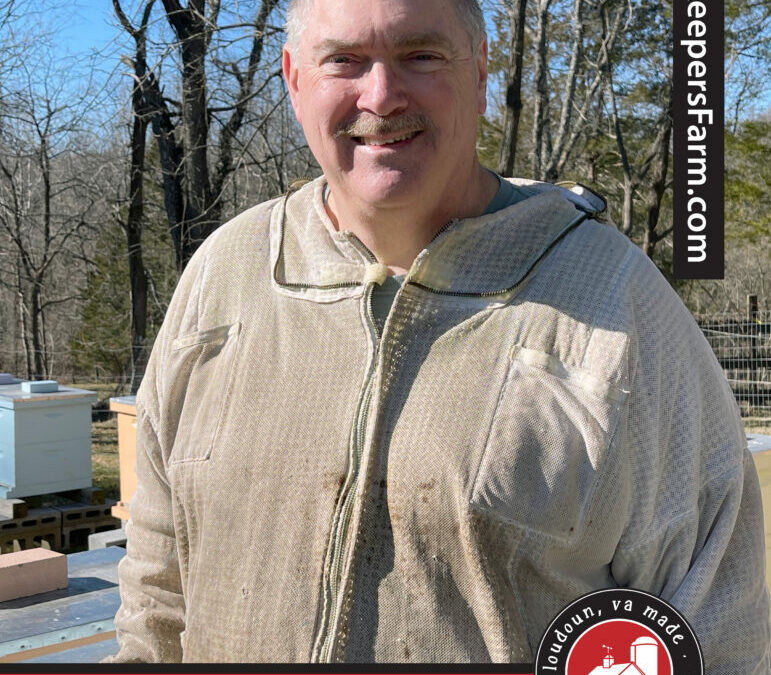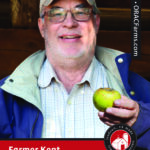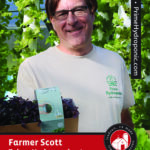This feature on Farmer George is part of Loudoun Economic Development’s award-winning Farmer Trading Card series, spotlighting farmers as heroes to our community. For more information on the Farmer Trading Card 2023 starting lineup, please visit Loudoun Farms.
What’s all the buzz around farming in Loudoun County? It could be Farmer George Forristall, who maintains 35 hives at The Beekeeper’s Farm, as well as JK Community Farm and Willowsford Farm throughout Loudoun County.
The numbers vary widely over the course of a year, but it is typical for each hive to be home to 20,000 to 80,000 bees. That’s upwards of 2.8 million bees that Farmer George tends for.
“The reason I got into keeping bees is because I like insects,” Farmer George explained. “I raise my own bees and sell nucs.”
“Nucs” is slang for nucleus colony that is both the colony itself and the hive structure that it comes in. Most nucs include one frame of honey, two frames of brood (baby bees), one frame of pollen, and the most important part: a new queen bee.
“The fun thing about keeping honeybees is learning about the different roles that bees have within the hive,” Farmer George explained. “Within the colony, which lives inside the hive, there’s one queen and her role is to lay eggs. She lays about 1,000 to 2,000 eggs per day.”
Queen bees are the only bees within a hive that can make more bees. Every other role is in her support.
“There’s worker bees that make up the majority of the hive and they have various roles,” he said. “They gather nectar, they gather pollen, they guard the hive.
“There’s also what we call house bees – they take care of the larva and clean the hive out. Then the third bee inside the hive are the drones bees, and they mate with the queen.”
The Beekeeper’s Farm is one of several major bee farming operations in Loudoun County, which leads all of Virginia in both the number of honeybees and overall honey production.
For Farmer George, beekeeping is a passion that he shares with his family.
“My family enjoys helping with the extracting, processing, bottling, labeling and selling of the honey and products at the farmer’s markets,” he said. “But most of all, they enjoy being the quality control staff, tasting the honey!”
Honeybees are not only essential for producing honey, but they are also important for pollinating the other food products we enjoy. Pollination is a critical step in crop reproduction, and most plants rely on bees to play that role. The bees get nectar that they turn into honey, the plants get pollinated, allowing them to produce fruit and seeds.
Both sides mutually benefit, which is called a symbiotic relationship. However, honeybees are increasingly threatened by environmental factors (change, mites, loss of habitat), and need humans to help them bounce back.
Without honeybees, many of our favorite local products would not exist, and our food production would significantly decrease. Locally, pollinators help support Virginia’s reputation for apples, peaches, berries, cut flowers and so much more.
In addition, honeybees are also essential for pollinating crops that are used to feed livestock, such as alfalfa, clover, and soybeans.
Farmer George only took his first beekeeping class in 2017. Later that year, he opened his beekeeping business and embarked on a fully organic farming operation.
Pardon the pun, but organic farming is more than a buzz word when it comes to beekeeping. It provides a healthier environment for bees to thrive in. Bees are extremely sensitive to environmental changes and can be harmed by exposure to pesticides and other chemicals commonly used in conventional farming practices
Without pesticides and herbicides, organic farming promotes biodiversity on the farm. This benefits bees by providing them with a wider range of flowers and other plants to feed on. This can help ensure a stable food supply for bees throughout the year, and also help support the health of the ecosystem as a whole.
Shopping from local beekeepers may be more than just delicious – it can also help support a healthy immune system.
There is some evidence to suggest that consuming local honey may provide relief from seasonal allergies. The theory behind this is that local honey contains small amounts of pollen from local plants, which can help desensitize the body to these allergens over time.
To support Farmer George and his family-owned small business, you can find his raw and infused honeys, as well as beeswax lip and body balm at farmer’s markets beginning June 2023. His products also retail at The Whole OX in Marshall, and a portion of his honey is donated to the JK Community Farm to help support food insecure families in Loudoun County.
“I hope you enjoy my farmer trading card,” Farmer George said, “and I hope to see you at one of my bee yards one day soon!”
Thinking of starting or expanding your business in Loudoun County? We are a full-service economic development organization, dedicated to your #LoudounPossible business success. Working with us is like adding a team of no-cost specialists to your team, with expertise in the following areas:
- Site selection and real estate searches;
- Workforce development and pipeline support;
- Process and permit navigation;
- Fast-track and financial incentives;
- Marketing and communications outreach;
- Networking, resource and industry introductions.
Contact John Magistro today to launch your #LoudounPossible journey.






